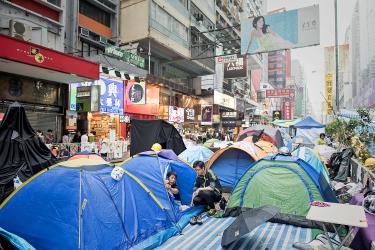China may have “lost” Taiwan as a result of its ham-fisted handling of the pro-democracy protests in Hong Kong, a Washington conference was told this week.
“There is no sense on the island now, if there ever was one, to buy into this ‘one country, two systems’ formula,” George Washington University professor David Shambaugh said.
Shambaugh, an expert on contemporary Chinese affairs, on Wednesday told the “Obama in China: Preserving the Rebalance” conference organized by the Brookings Institution that the predilection of the Chinese Communist Party was to “clear out” the Hong Kong protesters immediately.
“The fact that these protests have festered for so long has caused great anxiety inside the politburo,” he said.
However, if riot police are sent into the streets of Hong Kong to handle the protesters, it will greatly damage China’s public image.
As a result of what has happened in Hong Kong, the “one country, two systems” formula has been completely discredited in Taiwan, he said.
One thing you could say about the Hong Kong protests and the way they had been handled was that the situation had “lost” Taiwan for China, Shambaugh said.
Chinese President Xi Jinping (習近平) had inherited good cross-strait relations from his predecessor, Hu Jintao (胡錦濤), and while Xi had not done anything directly to undermine the Taiwan relationship, “what he is doing in Hong Kong is undermining it,” he said.
Xi is governing a “volatile” society and China’s economy is starting to stagnate, he said.
“There is overcapacity, overproduction and growing debt levels,” Shambaugh said, adding that at the same time, there has been economic and ethnic instability.
Xi’s reaction to the instability had been “repression,” he said, adding that Chinese internal repression is at its highest rate since 1989.
He said that the current crackdowns were a sign of insecurity within the CCP regime.
“These harsh measures are not the actions of a confident, comfortable, government,” he said.
Going into next week’s APEC summit in Beijing with Xi, US President Barack Obama needs to be aware of the “combustible cocktail” in China, he said.
“We are not dealing with a stable country or a secure regime,” Shambaugh said.
The day-long Brooking’s conference came on the same day that the London-based Financial Times published a column by David Pilling which said that to many in Taiwan, the ever-closer trade ties enshrined in the Economic Cooperation Framework Agreement (ECFA) “are nothing more than a trap — a ploy to increase Taiwan’s economic dependence on the mainland, thereby drawing it ever closer into its net.”
Taiwan is “mistakenly” no longer considered a dangerous flashpoint, while “Hong Kong and Taiwan, which China regards as equally integral parts of its territory, are in differing degrees of revolt. So are Xinjiang and Tibet,” Pilling wrote.
“In Hong Kong, China’s growing influence is causing an existential angst that is the root cause of pro-democracy demonstrations,” he said.
Pilling said that Xi can be seen as “losing his grip” and that territory he considers unambiguously Chinese “is squirming out of control.”
Source: Taipei Times - 2014/11/08









